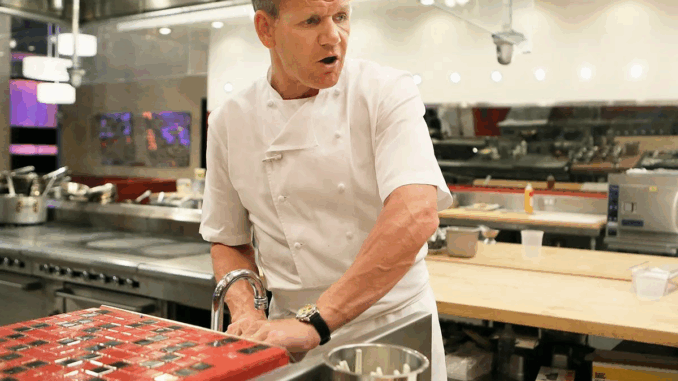
For years, Kitchen Nightmares has been sold to viewers as a noble mission. Gordon Ramsay, the fiery chef with Michelin stars and a volcanic temper, storms into failing restaurants, uncovers their deepest problems, shames the staff into changing, revamps the menu, and walks away leaving hope in his wake. The formula is addictive. Fans watch not just for Ramsay’s tirades but for the supposed transformation—restaurants on the brink of collapse seemingly pulled back from the abyss by the magic touch of a culinary savior. It has been marketed as part intervention, part inspiration, part brutal entertainment. But now, a storm is brewing around this beloved show.
A former restaurant owner who once appeared on Kitchen Nightmares has broken their silence, claiming that the experience was nothing like the edited fairy tale broadcast to millions of viewers. In a shocking interview, they allege that Ramsay’s team was more concerned with television drama than actual solutions. “He just came in for the cameras,” the owner revealed, their frustration still raw years later. “It wasn’t about helping us. It was about making a show. The problems we had weren’t fixed—they were highlighted for entertainment and then left behind.”
This accusation has struck a nerve with viewers who believed Ramsay was not just a performer but a genuine rescuer of struggling businesses. If true, it suggests that Kitchen Nightmares may have been more about spectacle than salvation. According to the owner, much of Ramsay’s fiery anger was exaggerated for effect, while key issues behind the restaurant’s struggles—financial mismanagement, staffing costs, local market decline—were barely touched. “They wanted me to fight with my chefs. They wanted screaming. They wanted chaos,” the owner said. “But the real problems? They didn’t care about those because they weren’t exciting for television.”
The allegation is not entirely unprecedented. Over the years, whispers have circulated that not every restaurant saved on the show remained open for long. In fact, investigative reports have found that many of the establishments featured on Kitchen Nightmares shut down within a year or two of Ramsay’s visit. While that could easily be chalked up to how difficult the restaurant industry is, some former participants have suggested that the show’s “fixes” were largely cosmetic—new paint, new décor, a few flashy dishes—while deeper operational issues were left unresolved. The recent testimony from this owner seems to confirm those suspicions.
Fans are reeling. On social media, debates have erupted about whether Kitchen Nightmares was ever truly about helping, or if it was always designed as pure drama packaged with the thin veneer of “improvement.” One disillusioned viewer wrote on Twitter, “I feel duped. I thought Ramsay was saving these people, but it sounds like he was just saving ratings.” Another commented on a Facebook fan group, “I always wondered why so many of the restaurants failed anyway. Now it makes sense—they were never really fixed.”
Of course, defenders of Ramsay argue that he can only do so much. One supporter noted, “He’s not a magician. He gives them tools, but if they don’t use them, they’ll still fail. You can’t blame him for that.” Others say the show never promised a permanent fix, only a chance at revival. Still, the idea that the “help” was orchestrated mainly for cameras undermines the very heart of the program’s appeal.
The restaurant owner’s accusations also highlight the larger issue of authenticity in reality television. How much of what viewers see is genuine, and how much is staged or exaggerated? In the case of Kitchen Nightmares, the edits often portrayed Ramsay as a miracle worker, able to transform chaos into order within days. But according to insiders, the production schedule was grueling and brief, often giving only a week or less to overhaul a restaurant. The reality of long-term management, consistent quality, and financial viability could never be fully addressed in that time. What viewers saw as a miraculous turnaround may have been nothing more than a temporary makeover designed to look good on television.

This owner, still bitter about their experience, insists that the show did more harm than good. “After the cameras left, we were stuck with the same debt, the same staff issues, the same competition down the street. Except now we had been humiliated on national television. Customers came in not to support us, but to gawk at the ‘nightmare’ they saw on TV. It was devastating.” Their story paints a picture of a production more interested in ratings than in truly helping small businesses survive.
The irony, of course, is brutal. Kitchen Nightmares presented itself as a lifeline for struggling restaurateurs, when in reality, according to critics, it may have been just another form of exploitation—turning their pain into entertainment while offering little in the way of lasting solutions. Fans who once admired Ramsay as a tough-love savior now wonder if he was simply playing a role scripted by producers eager for drama.
And yet, despite the controversy, Ramsay’s brand remains untouchable. He has continued to build an empire of shows—Hell’s Kitchen, MasterChef, Next Level Chef—each fueled by his fiery persona and unmatched charisma. Viewers seem willing to forgive, or at least overlook, the growing evidence that what they’re watching may not be as authentic as they believed. Entertainment, after all, often trumps reality.
But for those who lived through the experience, the scars remain. “I wouldn’t do it again,” the restaurant owner concluded. “It was good for TV, but it ruined us. Gordon Ramsay didn’t save my restaurant—he used it.”
The claim may not destroy Ramsay’s career, but it has added a new layer of skepticism to the way audiences view Kitchen Nightmares. Once hailed as a show about redemption, it now risks being remembered as just another piece of manufactured drama—one that left real people behind in its pursuit of ratings.
